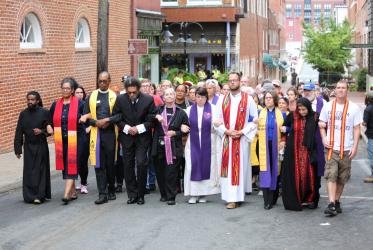Organized by the World Council of Churches (WCC) Commission of the Churches on International Affairs, the aim was to equip WCC member churches to engage with United Nations human rights mechanisms dealing with racial justice, and expose them to other situations of racial injustice worldwide. The training was delivered by human rights experts from the UN Office of the High Commissioner for Human Rights and from the International Movement Against All Forms of Discrimination and Racism.
The materials in the workshop acknowledged the stark reality of how racial injustice, discrimination and xenophobia are detrimental to individuals, communities, societies, and states.
Presentations offered key ways of achieving racial justice by highlighting the life and dignity of victims—a core dimension of WCC’s legacy since its inception.
Martha Pedoniquotte, a community capacity development coordinator for the Indigenous Ministries and Justice Unit of the United Church of Canada, spoke about the intersectionality between racism and sexism, from an Indigenous perspective.
As Indigenous People were driven from their homelands, “it was illegal to hold traditional ceremonies or spiritual practices,” she said. “Indian-ness was not to be tolerated.”
Children as young as four years old were ripped for their mother’s arms and placed up to ten years in residential schools, she said. Whereas once women were viewed as the lifesavers and caretakers of life, the forced removal of children began a cycle of abuse.
Rev. Ajime Nelson Zuwed spoke about racial justice issues in the Cameroonian context. “Cameroon is largely hospitable to people of other nations, races, tongues and colours, but suffers from acute internal discrimination based on their colonial history and heritage,” said Zuwed. “This discrimination has been lurking since 1961, and resulted in an armed conflict in 2017 between the Francophone majority-dominated government and the Anglophone minority.”
Rev. Ely Bulnes, who came as an immigrant to the US from Honduras, asked a key question: “Is there racial discrimination and xenophobia against the Latino community in the USA?”
The answer, said Bulnes, is a huge yes. “In the United States, racial discrimination and xenophobia have increased in recent years,” she said. “We have seen anti-immigrant policies that are very marked and easily spread over the internet. However, the anti-Latino discourse in the US is not new.”
The training focused on WCC member churches in North America, the Caribbean, Latin America, Western Europe and Western Africa. A similar training, organised later in the year, will focus on representatives from member churches in Africa, Asia, the Middle East and the Pacific.
“Since we started the training on UNESCO International Mother Language Day, we asked all participants to greet each other in their respective mother tongue when introducing one another. It was very important to kick off this virtual training on racial justice by celebrating the richness and diversity of each other’s identity and culture,” said Segma Asfaw, WCC Commission of the Churches on International Affairs staff.
“In addition to the technical training on UN human rights mechanisms, we made room for country presentations to give participants an opportunity to learn from challenges in other contexts. We also encouraged participants to contribute to two thematic sessions on the intersectionality between racism and COVID-19, as well as racism and sexism,” she added.








